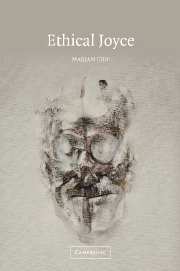Book contents
1 - Ethical interpretation and the elliptical subject
Published online by Cambridge University Press: 22 September 2009
Summary
What am I to do, what shall I do, what should I do in my situation, how proceed? By aporia pure and simple? Or by affirmations and negations invalidated as uttered or sooner or later? Generally speaking. There must be other shifts. Otherwise it would be quite hopeless. But it is quite hopeless. I should mention before going any further, any further on, that I say aporia without knowing what it means.
Samuel BeckettThe aporia that is Beckett's mark of uncertainty, invalidation, and even hopelessness is for Joyce a rupture in certainty that makes possible ethical thought. Aporia signifies the breakdown of immediate or accessible meaning, as Beckett indicates, because the word etymologically signifies a pathless path or an impassable passage, suggesting difficulty and perplexity. In rhetoric it is an indication of real or pretended doubt. For Joyce, educated in a Jesuit tradition in which doubt and the intellectual impasse are the very bases for Catholic faith and drawn to the Celtic philosophers of uncertainty, the figures of doubt and impossibility, the undermining of determinate meaning, the path that gives way, all of these are intellectual opportunities for creativity, for path breaking, for the entertaining of possibility from within the impossible. Jacques Derrida notes that aporia as nonpassage is a form of arrest: “nonpassage because its elementary milieu does not allow for something that could be called passage, step, walk, gait, displacement, or replacement, a kinesis in general.”
- Type
- Chapter
- Information
- Ethical Joyce , pp. 30 - 53Publisher: Cambridge University PressPrint publication year: 2002



